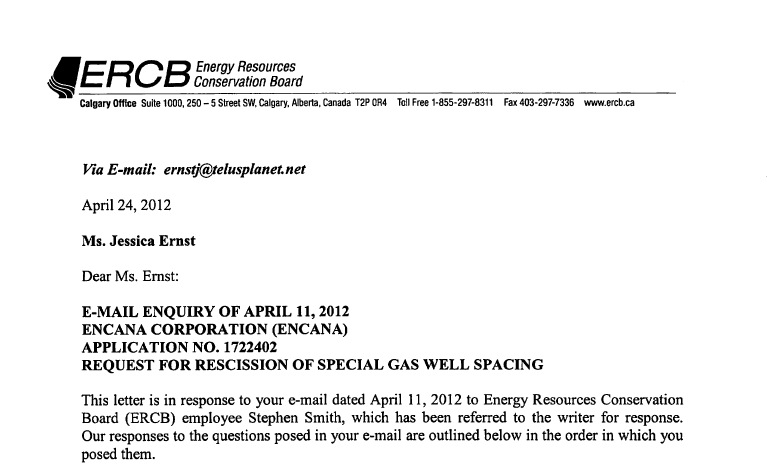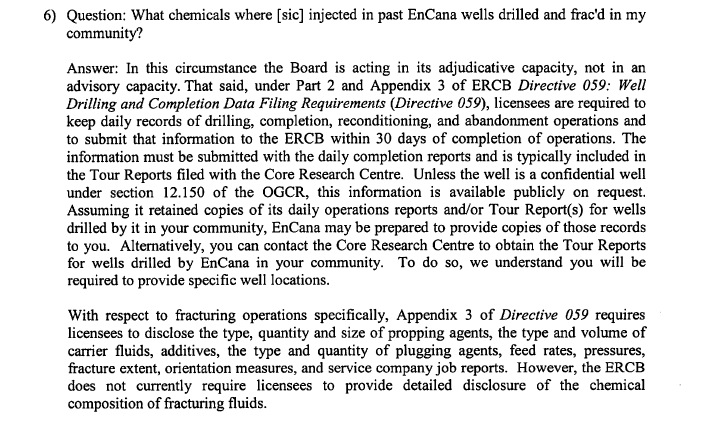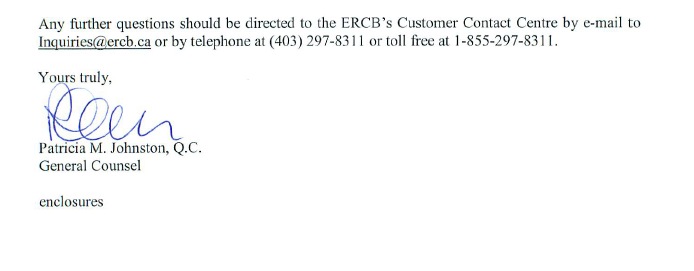New fracking practices reach for ‘low hanging fruit’ by Victoria Paterson, February 7, 2012, Mountainview Gazette
Nationwide operating practices for shale hydraulic fracking operations introduced by the Canadian Association of Petroleum Producers (CAPP) for its members on Jan. 30 failed to impress the Alberta NDP’s environment critic. MLA Rachel Notley (Edmonton-Strathcona) said many of the new requirements that CAPP has set out for its member producers, like the disclosure of additives to fracking fluid, were already in place in Alberta. “The key thing here is this is another example of industry self-policing,” Notley said, calling it “absolutely the wrong model.” “They’re not reinventing the wheel,” she said, adding that it’s “a ridiculous way” for industry to “pretend” they are addressing safety and environmental concerns.
The issue of fracking fluid additive disclosure was “low-hanging fruit” for CAPP, she said.
Notley continues to call for an independent scientific study of hydraulic fracking. She first issued the call for a study after a well blowout near Glennifer Lake, about 25 kilometres west of Innisfail, occurred on Jan. 13. The blowout occurred after a hydraulic fracturing operation interacted with another nearby well, though the incident is still being investigated by the Energy Resources Conservation Board (ERCB).
Referencing groundwater testing, which was another new CAPP requirement, Notley said groundwater is not well-mapped in Alberta and neither are abandoned or partially abandoned wells. She said this makes it difficult to determine if a hydraulic frac operation is going to interact with either old wells or water. Notley said efforts should be made to better map groundwater and old wells and “not by an industry that stands to make a whole bunch of money.”
The six new operating practices for CAPP operators of shale hydraulic fracs were announced on Jan. 30 by Dave Collyer, president of CAPP. CAPP says it represents companies that produce more than 90 per cent of Canadian natural gas and crude oil. Travis Davies, a spokesperson for CAPP, said the new standards of practice that were released on Jan. 30 are the “meat on the bones” of hydraulic fracturing operating guidelines that CAPP set out in fall 2011. “It’s less about communication and more about demonstrating what we’re doing on the ground,” Davies said of the new operating practices. The six new guidelines for CAPP members include practices for disclosure of fracturing fluid additives; fracturing fluid risk assessment and management; baseline groundwater testing; wellbore construction and quality assurance; water sourcing, measurement and reuse; and fluid transport, handling, storage and disposal. Much of the information is meant to be available to the public. Davies suggested third party groups and company websites could be a resource to release the information to interested persons. Davies said it’s believed that regulatory bodies will eventually be moving in the direction of requiring similar practices to the ones CAPP has come up with for its members. “A lot of companies do this work already,” Davies said. Adding steps like testing and monitoring groundwater could add costs for operators but representatives from member companies helped develop the requirements, Davies said. “It’s the cost of doing business,” he said. “Public perception and how we treat safety” were two of the reasons Davies listed for having the new practices.
Bob McManus, a spokesperson for Energy Alberta, noted some of CAPP’s new nationwide practices are “already in place in Alberta” or at least encouraged. He pointed out that fracking fluid disclosure must be made to the ERCB and the public can ask for the information. “If someone wanted to know they can ask the ERCB,” he said. Bob Curran, a spokesperson from the ERCB, agreed that while there isn’t a publicly accessible database, people could request the information from the ERCB and it would be provided. “We’ve never really had any requests for that information,” Curran said.
Other CAPP protocols that do not fall within the jurisdiction of the ERCB, like groundwater testing, come under Alberta Environment, he said. However, Alberta Environment said there was no groundwater testing requirement in place at hydraulic frac operations on the provincial level. “Generally speaking we’re supportive of the CAPP strategy,” said Carrie Sancartier, a spokesperson for Albeta Environment. She said Alberta Environment monitors the groundwater of 250 wells across the province for quality and quantity and that information is available online. As for groundwater mapping, she said a project was undertaken to map the Calgary-Edmonton corridor and another one is starting for an area near Edmonton. “The goal is to eventually map the whole province,” Sancartier said. [Emphasis added]
[Refer also to: Website for fracking fluid disclosure in Alberta planned – eventually
ERCB Lawyer to Ernst: However, the ERCB does not currently require licensees to provide detailed disclosure of the chemical composition of fracturing fluids. ]
Source: Letter from ERCB Lawyer to Ernst in response to repeat requests by Ernst for chemical disclosure of fracturing fluids injected by EnCana into Rosebud drinking water aquifers and in approximately 200 gas wells fractured above the Base of Groundwater Protection around Rosebud.



